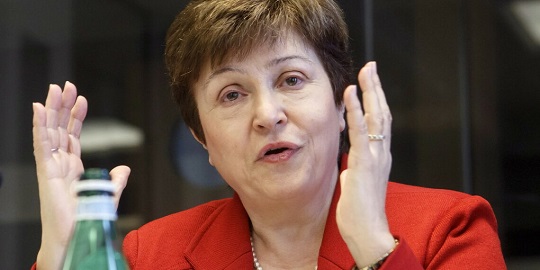The International Monetary Fund (IMF) chief, Kristalina Georgieva, has urged China to quicken its pace towards debt restructuring agreements for several countries, including Zambia, Ghana, and Ethiopia.
Speaking after her visit to China last month, Georgieva met with Li Qiang, China’s new top economic official, who she described as “very approachable and pragmatic.” Georgieva expressed her concerns over the prolonged duration it takes to reach debt resolution and the need to accelerate China’s participation in resolving debt relief cases.
The issue of debt restructuring has been a contentious one, with Western countries blaming China for causing delays in setting up restructuring agreements for heavily indebted countries.
Georgieva noted that China has multiple institutions that deal with debt, making it complicated domestically. However, she emphasized the need for China to play a constructive role in resolving these issues and speed up its participation.
The IMF chief revealed that approximately 60% of low-income countries are already in or at risk of debt distress, with about 25% of emerging economies facing high risk and “default-like” borrowing spreads. Georgieva called for greater progress on the matter and commended China for its help in reaching a debt relief deal for Chad and Sri Lanka, a middle-income country that was not eligible for help under the G20 framework.
While the IMF and Western countries have long warned of increased costs, economic friction, and GDP output losses associated with the global economy’s fragmentation into geopolitical blocs, with US-led democracies on one side and China and other autocratic states on the other, the issue of rising geopolitical tensions and the resulting fragmentation of the global economy could increase financial stability risks has been highlighted once again.
With Russia’s invasion of Ukraine heightening these concerns, the IMF has reiterated the potential risks associated with the fragmenting of the global economy, including reduced cross-border investments, asset prices, payment systems, and banks’ ability to lend.
During her visit, Georgieva emphasized the importance of multilateralism and opening up China’s economy for more trade and debt restructuring.
Chinese officials also expressed concerns over fragmentation, with their primary focus being the creation of jobs. Their target is to create 12 million jobs this year, reflecting the importance of employment generation in the Chinese economy.
The IMF chief’s visit to China has highlighted the need for accelerated debt restructuring agreements for heavily indebted countries. While China has been helpful in some instances, there remains much to be done to resolve the issue fully.
The potential risks associated with the fragmenting of the global economy have also been re-emphasized, with the IMF warning of the potential consequences. With both sides committed to multilateralism, opening up China’s economy for more trade, and debt restructuring, it remains to be seen whether progress can be made towards resolving this critical issue.
Source: norvanreports





